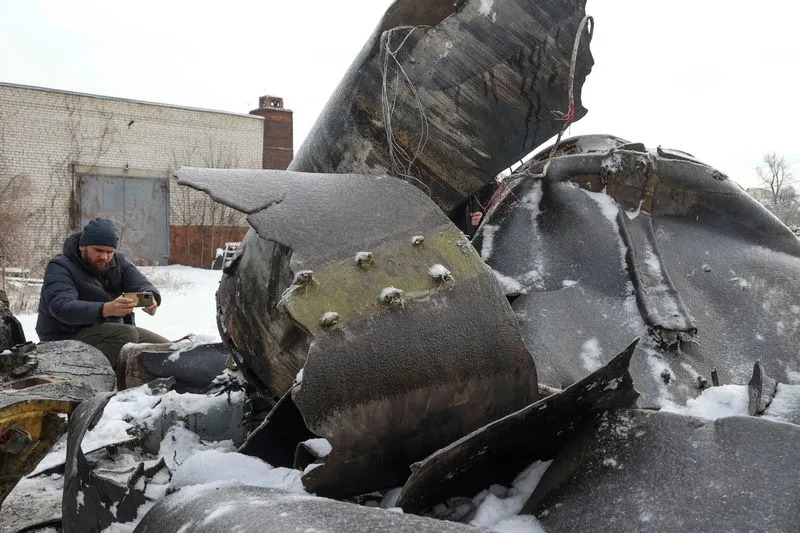Debris from North Korean missile in Ukraine could expose procurement networks

Revelations that a North Korean missile fired by Russia in Ukraine contained a large number of components linked to U.S.-based companies underline the difficulty of enforcing sanctions against Pyongyang, but could help uncover illicit procurement networks, experts say.
A man photographs parts of an unidentified missile, which Ukrainian authorities believe to be made in North Korea, in Kharkiv.
Conflict Armament Research (CAR), a UK-based organization that tracks the origins of weapons used in conflicts, examined the remnants of a North Korean ballistic missile used by Russia against Ukrainian forces in Kharkiv on Jan. 2.
In a report released this week, it said it examined electronic components, including for the missile's navigation system, and found many were recently manufactured and bore the marks of companies based in the United States.
It said 75% of the components documented were "linked to companies incorporated in the United States," 16% to companies in Europe, and 11% to companies in Asia.
Date codes on the components indicated more than three quarters were produced between 2021 and 2023 and that the missile could not have been assembled before March last year, the report said.
Sanctions experts said the findings were not surprising even though for years the United States has led international efforts to restrict North Korea's ability to obtain parts and funding for its ballistic missile and nuclear weapons programs.
CAR said its findings showed both how difficult it is to control the export of commercial electronic components, and how reliant countries such as North Korea, Russia and Iran are on imported technology.
"North Korea (and Russia and Iran) are experts in avoiding U.N. and U.S. sanctions through front companies and other efforts," said Anthony Ruggiero of Washington's Foundation for Defense of Democracies think tank, who directed North Korea sanctions efforts in the Trump administration.
"While U.S. sanctions are robust on paper, sanctions must be enforced to be effective," he said, stressing the need for Washington and it allies to continually update sanctions lists and spend on enforcement.
"We are not doing either one on North Korea sanctions," he said, adding that the Biden administration particularly needed to do more to target Chinese companies, individuals, and banks aiding sanctions evasion.
CAR said it was working with industry to trace the missile components and identify the entities responsible for their diversion to North Korea, so would not identify the companies linked to their production. It also did not identify specific components.
Martyn Williams of 38 North, a Washington-based North Korea project, said many components made by U.S. firms were easily available online or from electronics markets around the world.
"That North Korea can get these is not surprising at all, and I don't think anyone imagined the sanctions regime would be able to stop the flow of common components," he said.
"There are however much more specialized components in missiles and some of those are not a click away on the internet. Those are also the type of thing that sanctions are meant to stop, so the presence of more specialized components would be more worrying."
Katsu Furukawa, a former member of the U.N. Panel of Experts in charge of monitoring U.N. sanctions against North Korea, said the bulk of the components shown in a photo in the CAR report appeared to be widely available commercial items.
However in past U.N. investigations, he said, there were usually a few specific items such as pressure transmitters and flight control computers that enabled investigators to track procurement routes and identify the perpetrators.
38 North director Jenny Town said such specialized items could only be obtained from a small number of vendors and should have more of a procurement paper trail.
The U.S. State Department said Washington uses export controls, sanctions, and law enforcement actions to prevent North Korea acquiring technology for its weapons programs and to prevent Russia acquiring such weapons.
"We work closely with the U.S. private sector, as well as foreign allied and partner states, in these efforts," a spokesperson said.
- Questions and Answers
- Opinion
- Motivational and Inspiring Story
- Technology
- Live and Let live
- Focus
- Geopolitics
- Military-Arms/Equipment
- Безопасность
- Economy
- Beasts of Nations
- Machine Tools-The “Mother Industry”
- Art
- Causes
- Crafts
- Dance
- Drinks
- Film/Movie
- Fitness
- Food
- Игры
- Gardening
- Health
- Главная
- Literature
- Music
- Networking
- Другое
- Party
- Religion
- Shopping
- Sports
- Theater
- Health and Wellness
- News
- Culture


